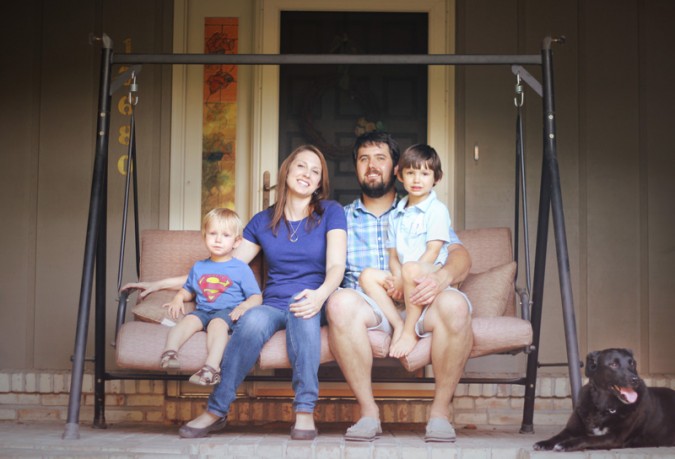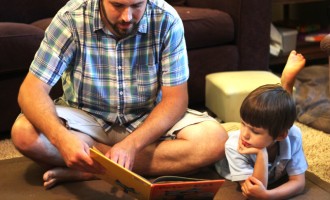Family values
Published on July 29, 2014 in Education
In this busy digital age, where do parents go for help and networking? Our Early Learning Communities are providing an answer by helping parents and caregivers access resources in a space where they can form relationships with one another. The Haase family is one of thousands that have benefitted from these supportive networks.
Video by Charles Ashley. Story by Valerie West.
These days, Millennials on Facebook are more likely to see photos of their former classmates’ new babies flooding their timelines than the epic parties they attended a few years ago.
Since I was never one for frat parties, I can’t say I mind the change. I don’t have kids, but I stand in awe of my friends and colleagues who do. How do they juggle the never-ending demands of work and parenthood?
Be it the city or the suburbs, the maxim, “It takes a village to raise a child” has never seemed more true than it does today. Add in the projected cost of raising a child to adulthood, and any little bit of free help is welcome.
United Way understands that Greater Detroit families face significant challenges when it comes to preparing their children for the first day of school. And those first few years of a child’s life are vital: Research indicates that nearly 90 percent of a child’s brain is formed by the age of 3, which means young children need a nurturing and literacy-rich environment to help them succeed later in life.

Rebecca and Garrett make their two boys, Finn and Jude, a priority.
To help parents, United Way has created a type of village, called Early Learning Communities (ELCs), with our trusted partners. Here, parents can share ideas and learn best practices through childrearing workshops so that they can prepare their little ones starting on Day One. There are 9 full-service hubs and 19 satellite locations. In the last year, we’ve taken the ELC programming to 65 community-based locations.
Two kids and a dog
I came to know the Haase family through our Early Learning Communities. When I first entered the family’s home, I was greeted by 4-year-old Finn. Dressed in a light blue polo and shorts, Finn was the perfect host to show me around.
“Do you want to go see my room?” he asked me.

The family makes sure to spend time together and enjoys playing outdoors.
Family photos adorned the hallway leading to Finn’s room. Once inside, Finn jumped on his bed and held up Curious George, asking if I knew the mischievous monkey. Luckily, I was well-versed in some of the childhood icon’s adventures. He then showed me some of his artwork, including a turkey he’d made out of green construction paper and a pinecone, noting that he looked for the “puffy” pinecone in the woods himself.
Finn’s parents, Rebecca and Garrett, also have a younger son, Jude, who was waking up from a nap. Garrett is a contractor and Rebecca recently went back to work as a bookkeeper.
I never thought…
The parenting duo are committed to their children’s education and have gone to great lengths to provide their boys with the skills they’ll both need to succeed in school. Rebecca, who was a full-time stay-at-home mom after Finn’s birth, joined an ELC in the hope of connecting to other moms.
“Nothing can truly prepare you for parenthood,” Rebecca said, adding that she sought the support of other parents who were going through some of the same struggles she was.
“I’m the mom I always said I’d never be. ‘I will never have a kid in bed with me. I will never home school…’ ”
“You’ll never have a mini-van,” Garrett interjected, laughing.
The two also shared struggles they never anticipated, like getting Finn to sleep and in the morning, struggling to get the boys ready to leave. “We’re always late,” Rebecca said.
Starting early
The second day after Finn was born, Rebecca read him “Where the Sidewalk Ends” by Shel Silverstein. The habit stuck. The couple reads to their boys every day. At the ELCs, parents are given tips on how to engage with their children by reading. They can also check out free books and other age appropriate toys and resources from the ELC lending libraries..

Rebecca and Garrett make sure they read to the boys every day. Now, Finn likes to read to his dad.
A large plastic bin in the Haase family living room was overflowing with books. Finn sifted through and chose “Pete the Cat: I Love My White Shoes,” by James Dean.
His parents told me that he’s nearly memorized the book. As he read to his family, his r’s came out more like w’s — red became “wed” and raspberry “waszbewwy.” Jude joined in and sang along as Rebecca and Garrett listened.
A Community resource
While there are many joys that come with parenting, there are also some stresses. For many parents, navigating unsolicited advice from well-intentioned family members can be one of them.
For the Haase family, those stressors have revolved around the topics of food and discipline.
Both Rebecca and Garrett are concerned about their children’s nutrition. Even on their tight budget — the family has one car and chose to forego cable and internet — they try to buy organic whenever they can, which can be difficult.
As for disciplining children, Rebecca also bucked the trend of family members who chose to spank. She was influenced by an ELC course on conflict resolution. Rather than spanking or isolating a child in timeout, Rebecca has her children communicate their feelings.
For instance, if Finn fights over a toy with another child, Rebecca will serve as a mediator by withholding the toy from the children and asking each child to talk about what he or she wants.
“I don’t want to force my kid to say he’s sorry — I don’t want him to grow up giving insincere apologies,” she said. “I want to show him how to fix a problem that’s been created — or that he created. Usually, children will compromise and figure out a solution by themselves.”
Garrett added that it’s not about telling children how to behave. It’s about offering guidance and treating them like people with emotions.
Rebecca and Garrett agree that the ELC courses have been invaluable. “These classes taught us how to put the ball in their court, and give them a voice.” Garrett said. “The children really do have thoughts and opinions.”
Both parents work hard to help the boys develop self-motivation. “Parents can motivate their children externally,” said Rebecca, “but that doesn’t mean they are going to do the right thing as teenagers without someone standing over them.” Motivation has to come from within.
The most important thing
Rebecca and Garrett practice hands-on parenting together, and they enjoy it. Before kids, they had ideas of what parenthood would look like. In practice, they’ve changed their outlook a bit.
“I want them to be contributing members of society, and good parents and good people.”
Rebecca said her biggest advice to other parents is for them to get involved with different networks and engage with their children every day.
“It’s important to connect with your child,” she said. “One of the things that surprised me once I became a parent was just how much I actually enjoyed being with my kids and with our little family unit.”